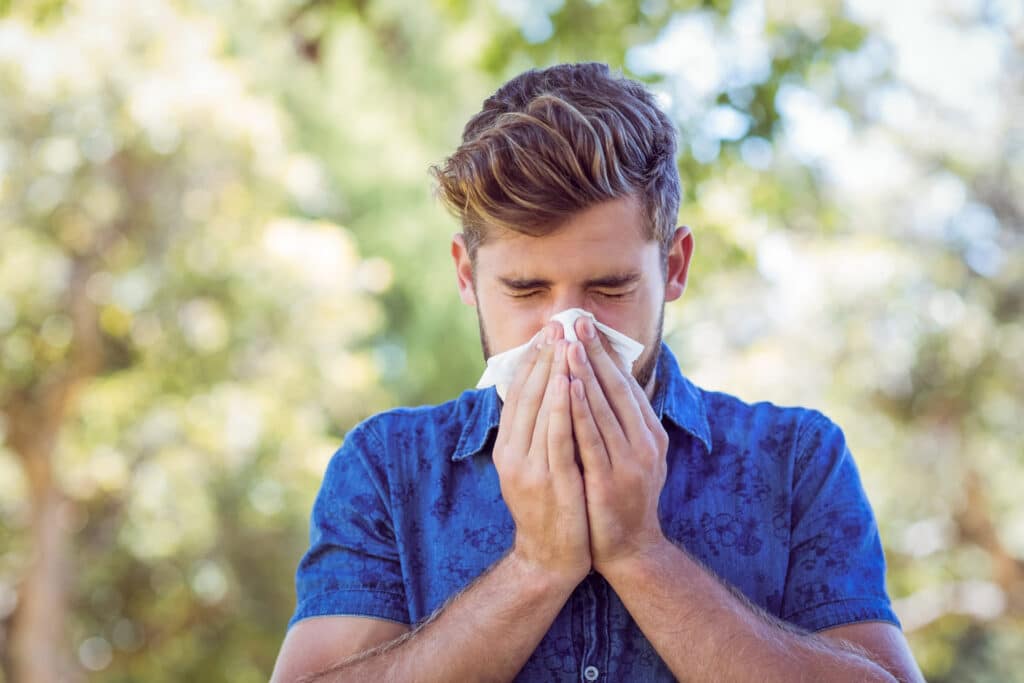March 1, 2023

Although we might think of summer hayfever as the worst time for allergic reactions to pollens, many people experience the symptoms of runny or blocked noses, itchy eyes and sneezing much earlier in the year. Tree pollen can cause a big issue for many sufferers, especially as we can also get high winds that can send the pollens flying far and wide.
Whether your allergies start in the spring or not until June time, now is a good time to start getting your body prepared.
Many people recommend using local honey, a teaspoon a day, early in the season. The idea is that the local honey will contain tiny amounts of local pollens and may help your body get used to them and cope better later in the year. It might not work for everyone, but if you can get a local honey, it is worth a try. It will certainly help soothe your throat and the NHS recommend honey as a good treatment for an uncomplicated cough.
Looking forward to spring can bring happy thoughts of better weather, unless you are an allergy sufferer…
In recent years, the Royal College of GPs has warned that people my get confused and worried over their symptoms of allergic rhinitis (hay fever) especially as some symptoms are similar to the coronavirus. If you are concerned that your symptoms are different to usual or if you have not experienced hayfever or allergic responses before, it is worth keeping an eye on your symptoms and see how they develop, testing where necessary.
There are some simple steps you can take to help lessen the symptoms, keeping doors and windows closed, especially on windy days, can help reduce the amount of pollen that comes indoors. Wearing sunglasses, even on not so bright days can help reduce eye irritation.
A cold flannel, slices of cucumber or raw potato are also easy and natural solutions to help reduce irritated or puffy eyes.
If you experience a blocked nose, using oils such as eucalyptus or tea tree in a diffuser or even a bowl of hot water (kept well out of the reach of children and pets), can help clear the head and nose. Peppermint oil also has anti-inflammatory properties and is another good option to clear the nose and help reduce a heavy head.
If you are heading out and about, The Met Office produce a regional pollen forecast which can help you plan ahead.
If your allergies are more than just pollen, perhaps made worse by dust or pet hair, it is worth looking at Allergy UK as they have a wide range of fact sheets and useful advice.
So what else can you do to help ensure you are as prepared as possible to cope with the pollen season?
As always, a healthy and balanced diet is important. With as many fresh fruit and vegetables as possible as these give you a wide range of antioxidants that can help reduce inflammation and maintain healthy mucous membranes. Here is the UK, we seem to be experience ‘rationing’ of many popular fruits and veg, so maybe it’s a good time to try something new that you haven’t had before.
A diet that includes a high intake of fresh fruit and veg can provide a valuable source of antioxidants.
Some people find that dairy products such as milk and cheese, can aggravate and increase congestion and catarrh. If this is the case, try to reduce intake while your symptoms are at their worst. Look for plant based milks such as rice and oats as an alternative.
This is possibly due in part to the histamine content, so it is worth seeing if a reduction of intake helps your symptoms. Other foods high in histamine include alcohol, caffeine, smoked meat and some nuts including walnuts and cashews.
Keeping hydrated is important too, herbal teas are a good alternative, especially if you are trying to avoid milk. Try nettle tea as a good detoxifier, chamomile as a soothing bedtime tea and vitamin C and bioflavonoid containing rosehip for a bright and fruity taste.
Herbal teas are a great way of keeping hydrated and useful alternatives if you are avoiding dairy products.
There are also supplements that can be added to your wellness regime and are worth considering if you experience allergic reactions at this time of year.
One of the most popular is the bioflavonoid Quercetin. In nature this is found alongside vitamin C and supports vitamin C absorption and activity. But it also has functions itself, research suggests that it can be useful for respiratory and allergic reactions as it helps protect against a histamine response.
We are still at the time of year where we might not get enough vitamin D from sunshine, especially if you are not getting out much. Vitamin D plays so many roles in the body but is also known to contribute to the health of the immune system.
Underpinning your regime with a multi vitamin and mineral plus a friendly bacteria supplement, can help support your system and maintain your wellness levels. Allowing you to get on with enjoying the (hopefully) better weather heading our way.
Back to Blog